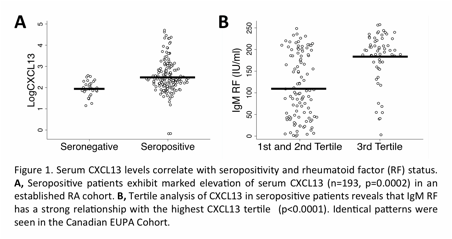Session Information
Session Type: Abstract Submissions (ACR)
Background/Purpose: CXCL13 is a B cell chemokine whose expression has been reported to be elevated in serum and synovium from patients with rheumatoid arthritis (RA). Synovial production of CXCL13 has been associated with lymphoid aggregates and germinal center formation. We analyzed the relationship of serum CXCL13 levels to several clinical and serologic parameters, using both established and early RA cohorts.
Methods: Patients with established RA were recruited from the rheumatology clinic at Dartmouth-Hitchcock Medical Center. Serum CXCL13, Rheumatoid Factor (RF) levels, anti-citrullinated peptide antibody (ACPA) and total IgG were measured by ELISA. Seropositivity (positive for RF, ACPA, or both) and highly sensitive C-Reactive Protein (hsCRP) were determined by the clinical lab. HLA-DR status was obtained previously in RA patients from this cohort. A confirmatory analysis was performed using seropositive and seronegative samples from early RA patients from the Canadian Early Undifferentiated PolyArthritis (EUPA) Cohort. Statistical analysis was performed using STATA software, with t-test and linear regression utilized to evaluate relationships between variables.
Results: In the cross-sectional Dartmouth Cohort (n=193), log-transformed CXCL13 levels strongly correlated with seropositivity (Figure 1A, p=0.0002). Among the seropositive patients, several interesting patterns emerged. Linear regression of log-transformed CXCL13 plotted against RF levels was highly significant (p<0.0001). Tertile analysis demonstrated the strong association of high CXCL13 levels with RF titers (Figure 1B, p<0.0001). A weaker relationship was seen between CXCL13 levels and ACPA titers (p=0.02). A relationship between CXCL13 and total IgG was also observed (p=0.0009), but not with age, gender, shared epitope or hsCRP. Analysis of the Canadian EUPA Cohort (n=339) confirmed the strong relationship between CXCL13 and seropositivity (p<0.0001), as well as serum RF titer (p<0.0001). No relationship with ACPA or serum IgG levels was seen in this cohort. Moreover, no relationship was seen with age, gender, shared epitope status, DAS28-CRP or the presence of erosions. In contrast to DAS28-CRP, there was a weak association between CXCL13 levels and hsCRP (p=0.05).
Conclusion: Using both established and early RA cohorts, marked elevations of serum CXCL13 levels resided nearly completely within the seropositive population. Within this seropositive RA subset, CXCL13 elevations exhibited a surprisingly strong relationship with RF. The association of CXCL13 levels with either clinical (age, gender, DAS28-CRP, erosions) or serologic (ACPA, IgG) parameters was either much weaker or absent. These results suggest that serum CXCL13 levels not only identify differences in the pathophysiology of seronegative RA, but also may define a subset of seropositive RA patients.
Disclosure:
J. D. Jones,
None;
B. J. Hamilton,
None;
G. Challener,
None;
A. Fernandes,
None;
P. Cossette,
None;
P. Liang,
None;
A. Masetto,
None;
H. Menard,
None;
N. Carrier,
None;
G. Boire,
None;
W. Rigby,
None.
« Back to 2013 ACR/ARHP Annual Meeting
ACR Meeting Abstracts - https://acrabstracts.org/abstract/cxcl13-is-elevated-in-early-and-in-established-seropositive-rheumatoid-arthritis-and-correlates-with-rheumatoid-factor-levels/

